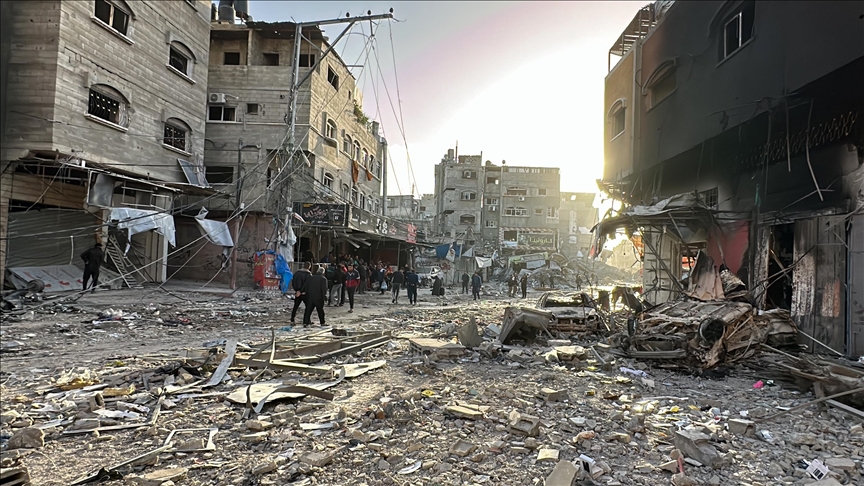Palestinians struggle to revive market in Jabalia’s refugee camp
‘Goods are scarce, prices are high, and there is no source of income for people,’ says store owner

GAZA CITY, Palestine
Palestinians in the Jabalia refugee camp, in the northern Gaza Strip, set up a market after the withdrawal of Israeli army forces from several areas, despite destruction and difficult living conditions.
Even though the conditions in northern Gaza are very harsh due to the Israeli war and the great destruction it left behind, residents and those who are displaced are trying to hold onto life in Jabalia.
Israel launched relentless air and ground attacks on the Gaza Strip since a cross-border attack by Hamas which Tel Aviv claims killed 1,200 people in Israel.
At least 23,843 Palestinians have since been killed, mostly women and children, and 60,317 injured, according to Palestinian health authorities.
According to the UN, 85% of the population of Gaza is already internally displaced amid acute shortages of food, clean water and medicine, while 60% of the enclave’s infrastructure is damaged or destroyed.
Hope for peaceful life
Inside one of the clothing stores in the camp, store owner Muhammad Nasr, who lives in the Jabalia al-Nazla area in Jabalia, is grateful for the small amount of goods he has left.
“Since the beginning of the war, no goods have entered the Gaza Strip, especially the north,” Nasr told Anadolu. "Goods are scarce, prices are high, and there is no source of income for people.”
“We just want to live like the rest of the world. Our children are wearing spring and summer clothes during this cold weather, and newborns do not have any clothes suitable for this climate,” he said.
Nasr calls for intervention to bring goods, especially winter clothes, into Gaza.
“Despite the continued Israeli aggression and bombing of various areas in the northern Gaza Strip, we are determined to live, and this is clear from the movement the market is witnessing," he added.
Residents in northern Gaza are suffering from humanitarian, health and environmental crises, and diseases and epidemics are spreading due to the overflow of sewage water and the lack of any clinics or medical centers, said Nasr.
‘Step in right direction’
Abu Sakhr Katket from the Jabalia Camp describes Gaza City and the northern Gaza Strip as “the most expensive area in the world.”
“The situation here is deplorable, and there is terrible population overcrowding,” said Katket
“The opening of the market is a step in the right direction because it indicates the residents’ will to live despite the ongoing aggression,” he told Anadolu.
Katket pointed out “the difficult conditions that the residents of northern Gaza are living in, the merchants’ exploitation of the current conditions, and the lack of consideration for people’s circumstances.”
"The bombing is around the clock, and there is no safe place here,” he said.
He said that “people have been displaced from Jabalia camp and the northern regions to schools and clinics.”
“We hope that the war will end and life will return to what it was before,” he added.
Katket, whose family is dispersed between the north and south, said that the Palestinian people “are fighting death.”
‘Everything within us is dead’
The suffering of Umm Muhammad Al-Afrangi, a resident of Jabalia, is no different from the rest of Palestinians in Gaza.
“We are displaced, we have lost loved ones, and we have lost our livelihoods,” Afrangi told Anadolu.
“Our children were killed and now everything within us is dead,” she said.
Afrangi, who was displaced to Jabalia’s Abu Hussein School, said: “People need food but it is scarce. We are living through a real famine.”
The conditions inside the shelter center are inadequate, as those displaced lack necessities for life, such as water and electricity.
Afrangi expressed joy at the return of life to the market. But she is also sad that she is unable to shop for essentials in light of the dire circumstances and the significant increase in prices of basic goods that are available.
Meanwhile, Ibtisam Al-Ashqar, who works as a teacher in the schools of the United Nations Relief and Works Agency for Palestine Refugees (UNRWA), told Anadolu that she has been displaced six times within the areas of northern Gaza.
“During the invasion of Jabalia, the situation was very difficult. We were drinking polluted water and standing in long lines for hours until we got a gallon of salty water,” said Ashqar.
She described the situation as “tragic, lacking the basic necessities of life, most notably water, flour, and electricity,” calling on the whole world to “stand by Gaza and support its people.”
“People here mostly consume rice to stay alive,” she said, noting that “even the bare minimum is not provided.”
* Writing by Ikram Kouachi
Anadolu Agency website contains only a portion of the news stories offered to subscribers in the AA News Broadcasting System (HAS), and in summarized form. Please contact us for subscription options.







